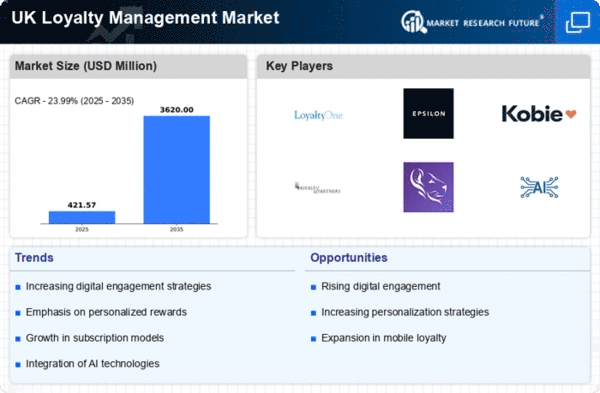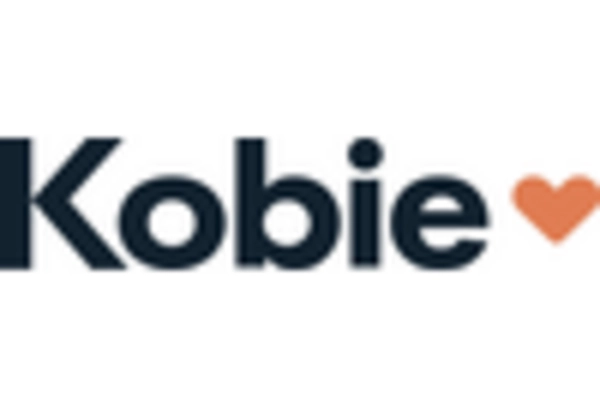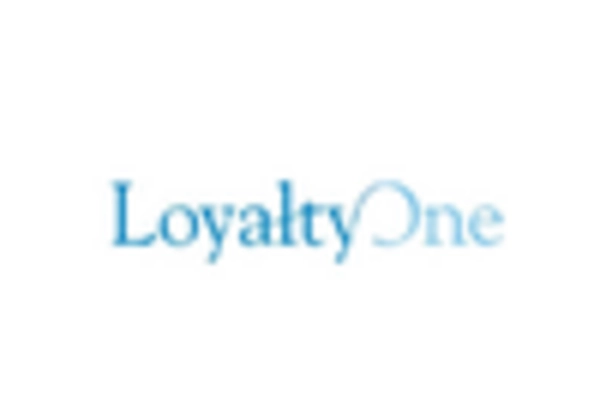Rise of Data-Driven Decision Making
In the loyalty management market, the rise of data analytics is transforming how businesses approach customer loyalty. Companies are increasingly leveraging big data to gain insights into consumer behavior, preferences, and purchasing patterns. This data-driven approach enables brands to create more effective loyalty programs that resonate with their target audience. In the UK, it is estimated that organizations utilizing data analytics in their loyalty strategies can improve customer satisfaction by approximately 25%. As businesses recognize the value of data in enhancing customer experiences, the loyalty management market is likely to see significant growth, driven by the demand for advanced analytics tools and technologies.
Competitive Pressure in Retail Sector
The loyalty management market is significantly influenced by the competitive landscape within the retail sector. As retailers strive to differentiate themselves, many are adopting loyalty programs as a strategic tool to attract and retain customers. In the UK, the retail market is characterized by intense competition, with numerous brands vying for consumer attention. This competitive pressure compels businesses to innovate their loyalty offerings, leading to the development of unique rewards and incentives. Consequently, the loyalty management market is expected to expand as retailers invest in more sophisticated loyalty solutions to maintain their market position and enhance customer loyalty.
Focus on Customer Retention Strategies
The loyalty management market is increasingly focused on customer retention strategies as businesses recognize the cost-effectiveness of retaining existing customers compared to acquiring new ones. In the UK, studies suggest that increasing customer retention rates by just 5% can lead to profit increases of 25% to 95%. This realization is prompting companies to invest in loyalty programs that not only reward repeat purchases but also foster long-term relationships with customers. As a result, the loyalty management market is likely to see growth driven by the demand for innovative retention strategies that enhance customer loyalty and drive profitability.
Consumer Demand for Enhanced Engagement
The loyalty management market is experiencing a notable shift as consumers increasingly demand more engaging and personalized experiences from brands. This trend is driven by the growing expectation for tailored interactions, which has been shown to enhance customer retention rates. In the UK, studies indicate that businesses that implement effective loyalty programs can see an increase in customer retention by up to 30%. As a result, companies are investing in sophisticated loyalty management systems that allow for real-time data analysis and customer feedback integration. This heightened focus on consumer engagement is likely to propel the loyalty management market forward, as brands strive to meet these evolving expectations and foster deeper connections with their customers.
Technological Advancements in Customer Engagement
Technological advancements are playing a crucial role in shaping the loyalty management market. Innovations such as mobile applications, artificial intelligence, and machine learning are enabling brands to create more interactive and user-friendly loyalty programs. In the UK, the adoption of mobile loyalty solutions has surged, with reports indicating that mobile apps can increase customer engagement by up to 50%. As technology continues to evolve, businesses are likely to invest in these advanced solutions to enhance customer experiences and streamline loyalty program management. This trend suggests a promising future for the loyalty management market as companies seek to leverage technology to foster stronger customer relationships.

















